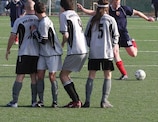God on the ball in Gdansk
Thursday, June 21, 2012
Article summary
UEFA.com's city reporter in Gdansk, Maciej Słomiński, enters a seminary in the shadow of Oliwa Cathedral and discovers that football and religion are not necessarily competing forces.
Article top media content

Article body
The middle of UEFA EURO 2012 seems like an odd time to enter a religious order, but as UEFA.com discovered with the help of the rector of the seminary in the shadow of Gdansk's beautiful Oliwa Cathedral, Father Jan Uchwat, God is everywhere at the finals.
With his would-be priests – some of whom play football together in the national league for seminaries – having exams during the finals, the seminary is unusually quiet at the moment. Amid the mood of contemplation, Father Uchwat is convinced that there are parallels between his institution and UEFA EURO 2012. "We think football fans and seminarians have a lot in common," he told UEFA.com. "Both groups have a profound belief in something."
Watching the tournament from Gdansk, the presence of the Roman Catholic church has been even more prominent than in the other host cities, largely due to the teams who played in Group C: Spain, Italy, Croatia and the Republic of Ireland. "We had a joke that God was overseeing the draw," said Father Uchwat. "Our group was jokingly named the 'Group of Pope' since the Spanish, Italians, Irish and Croatians who played in Gdansk are all Catholics. Plus us Poles, too."
All those extra believers meant that, like a number of other churches in the host cities, Gdansk Cathedral opened its doors to all nations at the finals. "We did masses in different languages here at the monumental Oliwa Cathedral, and in German too, as their squad have been staying just five minutes away from here," said Father Uchwat.
"A lot of Spanish people came, so I welcomed them in Spanish," added the priest, who lived in in Pamplona, where he acquired a liking for CA Osasuna and Real Madrid CF. "We also took to the streets. On 7 June, the day before the EURO began, we held a concert dedicated to our guests, the foreign football fans. Our people did some shows on the street: pantomimes, singing, gospel music."
The impressive Arena Gdansk is a cathedral of football, but there is a place for religion here, too. "There is a chapel in the new stadium," said Father Uchwat. "It's a very big sign of what faith means to football people. Is football the new religion? I wouldn't see them as being in competition.
"Football can encourage so many good things – it can bring men and women together, and young and old people, and the love of football is also a tradition passed through families, which is something I like. The game between Ireland and Spain was a great example – the fans got on very well. It was a good example to the world. Good people and good fans, basically."
The big question, however, as the quarter-finals approach is whether the power of prayer can really influence football results. Should fans ask God for help on the pitch? Father Uchwat thinks carefully.
"Prayer is a good thing, full stop," he concludes "It's not a question of 'my team beat your team, so my prayers were better'. No. The most important thing is to pray. Belief in God is something even bigger than football."





